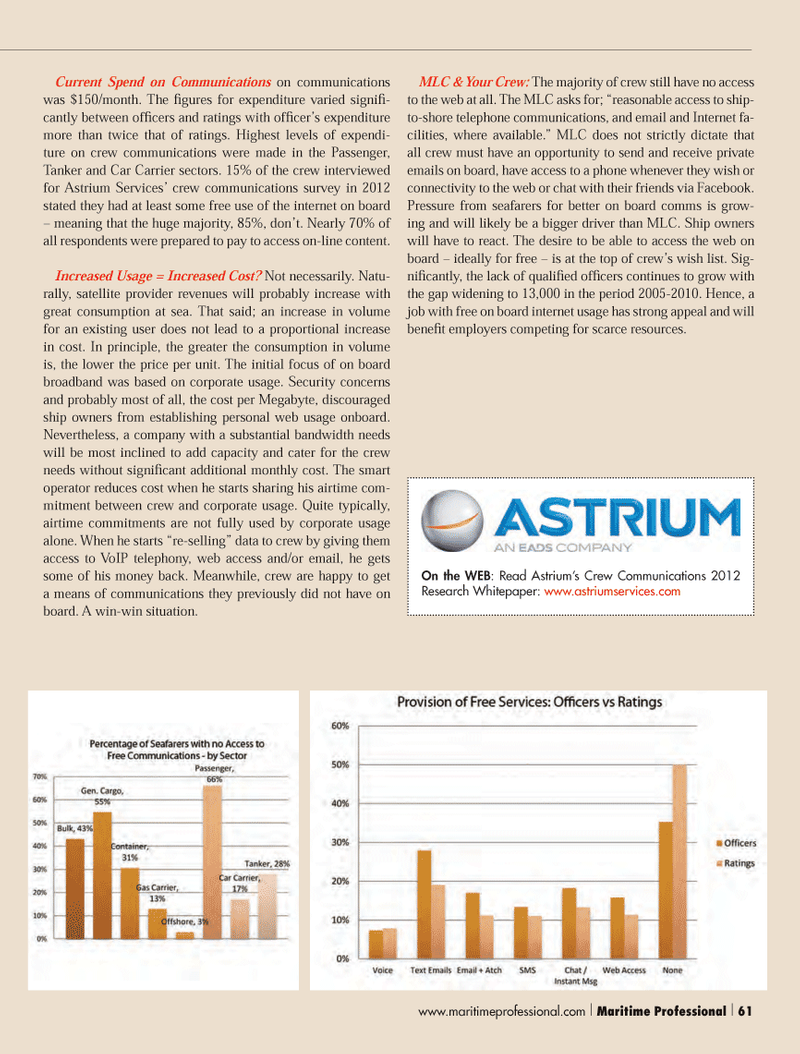
Page 61: of Maritime Logistics Professional Magazine (Q3 2013)
Training & Security
Read this page in Pdf, Flash or Html5 edition of Q3 2013 Maritime Logistics Professional Magazine
Current Spend on Communications on communications was $150/month. The Þ gures for expenditure varied signiÞ -cantly between ofÞ cers and ratings with ofÞ cerÕs expenditure more than twice that of ratings. Highest levels of expendi- ture on crew communications were made in the Passenger, Tanker and Car Carrier sectors. 15% of the crew interviewed for Astrium ServicesÕ crew communications survey in 2012 stated they had at least some free use of the internet on board Ð meaning that the huge majority, 85%, donÕt. Nearly 70% of all respondents were prepared to pay to access on-line content. Increased Usage = Increased Cost? Not necessarily. Natu- rally, satellite provider revenues will probably increase with great consumption at sea. That said; an increase in volume for an existing user does not lead to a proportional increase in cost. In principle, the greater the consumption in volume is, the lower the price per unit. The initial focus of on board broadband was based on corporate usage. Security concerns and probably most of all, the cost per Megabyte, discouraged ship owners from establishing personal web usage onboard. Nevertheless, a company with a substantial bandwidth needs will be most inclined to add capacity and cater for the crew needs without signiÞ cant additional monthly cost. The smart operator reduces cost when he starts sharing his airtime com-mitment between crew and corporate usage. Quite typically, airtime commitments are not fully used by corporate usage alone. When he starts Òre-sellingÓ data to crew by giving them access to VoIP telephony, web access and/or email, he gets some of his money back. Meanwhile, crew are happy to get a means of communications they previously did not have on board. A win-win situation. MLC & Your Crew: The majority of crew still have no access to the web at all. The MLC asks for; Òreasonable access to ship-to-shore telephone communications, and email and Internet fa- cilities, where available.Ó MLC does not strictly dictate that all crew must have an opportunity to send and receive private emails on board, have access to a phone whenever they wish or connectivity to the web or chat with their friends via Facebook. Pressure from seafarers for better on board comms is grow- ing and will likely be a bigger driver than MLC. Ship owners will have to react. The desire to be able to access the web on board Ð ideally for free Ð is at the top of crewÕs wish list. Sig- niÞ cantly, the lack of qualiÞ ed ofÞ cers continues to grow with the gap widening to 13,000 in the period 2005-2010. Hence, a job with free on board internet usage has strong appeal and will beneÞ t employers competing for scarce resources. On the WEB: Read Astrium?s Crew Communications 2012 Research Whitepaper: www.astriumservices.com www.maritimeprofessional.com | Maritime Professional | 61MP #3 50-63.indd 61MP #3 50-63.indd 619/10/2013 12:12:06 PM9/10/2013 12:12:06 PM

 60
60

 62
62
